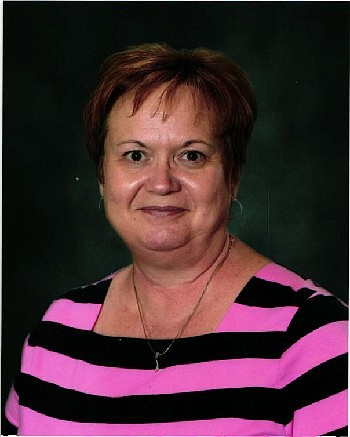By Helen Wilbers
JEFFERSON CITY - Former County Collector Pamela Oestreich said she knew the law would catch up to her eventually.
"I remember telling myself, in the early days, keep this up and you're going to prison," she told the Missouri Western District Court on Monday.
U.S. District Judge Stephen Bough sentenced Oestreich to 30 months in federal prison followed by three years of supervised release during Monday's hearing. The court also ordered Oestreich to pay $379,588 in restitution to the county, which includes approximately $280,000 in direct damages and $99,588 in indirect damages (such as audit expenses) resulting from her theft.
During the course of her theft, Oestreich made payments totaling $19,430 from her personal bank account into Callaway County Collector accounts to hide her theft, which reduced the amount of restitution ordered by the court.
Background
Oestreich held the collector's office from 1999-2018.
Central Bank officials reported suspicious activity in a collector's office-controlled checking account on March 15 and reported it to Callaway County Prosecuting Attorney Chris Wilson. Following that meeting, the prosecuting attorney informed Callaway County Sheriff Clay Chism of the report, then Chism and Wilson contacted the FBI.
Oestreich tendered her resignation immediately.
The case was investigated by the Callaway County Sheriff's Office and the Federal Bureau of Investigation. On March 19, county commissioners requested a state audit, which is required by law any time a county collector's seat is vacated. It began March 26. State Auditor Nicole Galloway's office discovered about $300,000 had gone missing between January 2016 and March 2018. Much of it was cash tax payments Oestreich never deposited.
Oestreich also wrote herself about $71,000 in checks from county funds, Galloway said.
Oestreich pleaded guilty Sept. 24 to one count of stealing from an organization that receives federal funds.
The hearing
The audience in the courtroom was packed during Monday's hearing. On the left sat Oestreich's family and friends; on the right, a number of county officials - Oestreich referred to them as her "ex-coworkers."
During her statement, she offered an apology to all who were harmed by the thefts.
"I realize that 'I'm sorry' coming from me means absolutely nothing to the people I've hurt," she said. "But it means everything to me to be able to say it publicly."
Supervisory Assistant U.S. Attorney Michael Oliver, who prosecuted the case, focused his remarks on the amount of damage done by the theft, both to the county's finances and to public trust.
"This is a method of conducting herself in office that destroys the very essence of people's trust in government," he said. "The most significant loss is the trust in government among everyday people that pay (taxes) to the government and expect that money will be handled with fidelity."
He said the thefts show a "sense of entitlement."
"He knows my crime but he doesn't know who I am," Oestreich said. "I've never felt entitled to anything in my life."
She claimed the thefts started after the stress of her job became more than she could deal with.
"In hindsight, I should have resigned and walked away," she said. "What I did do is hide in a corner of a casino and play slot machines. I wanted to be where nobody knew me and where I felt in control."
Her lawyer also stated Oestreich had been diagnosed with "adjustment disorder," a mental health condition Mayo Clinic describes as "(experiencing) more stress than would normally be expected in response to a stressful or unexpected event."
Hunt said due to the gambling, Oestreich profited little from her thefts. Oliver disputed that point.
"If you take her at her word, which you do at your own peril, her gambling losses totalled $164,000," he said. "She stole about $300,000 in less than three years. She made a decision, herself, to gamble and she gambled with the taxpayers' money."
Bough conceded it seems unlikely Oestreich will re-offend, but that federal guidelines require him to come up with a "sentence that reflects the seriousness of what you've done."
"You abused your position of trust," he said. "Any of us who decide to take on serving our government know it's a special thing. When we do that, we serve as the face of our democracy."
He noted Oestreich's supportive family.
"It makes me scratch my head," he said. "You had a support system that would have been with you at the drop of a hat."
Oestreich has 30 days to pay the restitution. After that, the government recommended she should be ordered to turn over her half-interest in the sale of her home (which she owns outright with her husband), to pay 25 percent of her monthly pension benefits from the County Employees' Retirement Fund, and to liquidate one of cars she owns with her husband as well as her part-interest in a residence she owns with her siblings.
"There's no way she can pay the restitution off in 30 days," Hunt said following the hearing. He said the sentence was "not surprising."
"We have a judicial system, there was a crime committed and the facts were presented," County Commissioner Randy Kleindienst said. "I support our process and how it was handled."
Chism thanked the taxpayers of Callaway County for their patience during the case's investigation and prosecution.
"I think the facts of the case speak for themselves," he said. "But it's not a matter of what my opinion is. The taxpayers of Callaway County are the true victims in this matter."
Galloway also voiced approval.
""Anytime there is corruption by a public official, it defrauds citizens of their hard-earned dollars," she said. "I appreciate the work of county officials and federal law enforcement to restore the public's trust. Together, we have sought justice and accountability for taxpayers. My audit this fall included a path forward for the county to better protect taxpayer dollars in the future, and county officials committed to making those changes."

